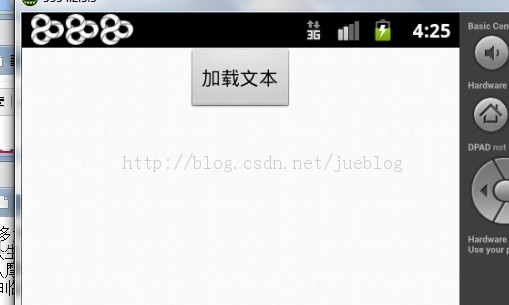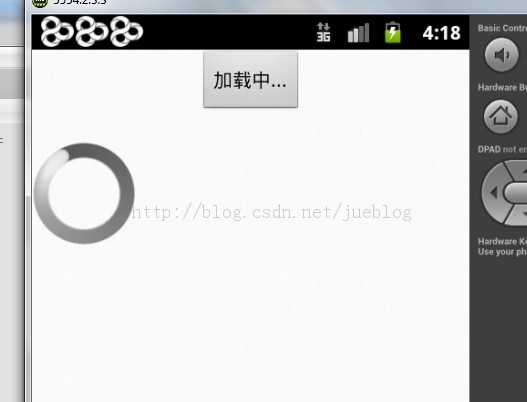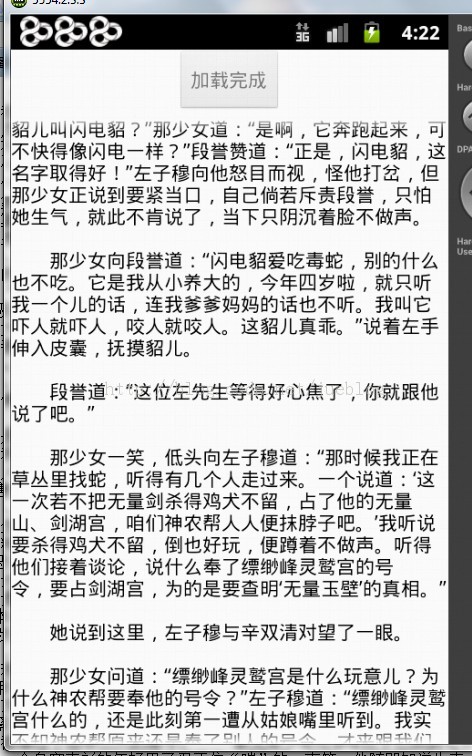最终目的
以JSON的形式,将数据存入服务器端。
在Android中,以Handler加载显示大批量文字。
在此以加载金庸小说《天龙八部(新修版)》为例(2580480 字节)。
以tomcat为服务器,在jsp中以I/O读取本机上的txt文件,写入JSON数据。
在加载过程中,以进度条的形式提示用户需要等待。
加载完成后,进度条消失,并显示加载内容。
Activity文件
package com.app.test02;
import java.util.Map;
import com.app.util.MyApplication;
import android.app.Activity;
import android.opengl.Visibility;
import android.os.Bundle;
import android.os.Handler;
import android.os.Message;
import android.view.View;
import android.widget.Button;
import android.widget.ProgressBar;
import android.widget.TextView;
public class HanderTest_Text extends Activity {
private Button button;
private TextView textView;
private Handler handler;
private ProgressBar progressBar;
@Override
protected void onCreate(Bundle savedInstanceState) {
// TODO Auto-generated method stub
super.onCreate(savedInstanceState);
setContentView(R.layout.activity_hander_text);
button = (Button) findViewById(R.id.button1);
textView = (TextView) findViewById(R.id.textView1);
progressBar = (ProgressBar) findViewById(R.id.progressBar1);
button.setOnClickListener(new View.OnClickListener() {
@Override
public void onClick(View v) {
// TODO Auto-generated method stub
progressBar.setVisibility(View.VISIBLE);
button.setText("加载中...");
new MyThread().start();
}
});
handler = new Handler(){
@Override
public void handleMessage(Message msg) {
// TODO Auto-generated method stub
super.handleMessage(msg);
textView.setText(msg.obj.toString());
progressBar.setVisibility(View.GONE);
button.setText("加载完成");
button.setEnabled(false);
}
};
}
class MyThread extends Thread{
@Override
public void run() {
// TODO Auto-generated method stub
String result = ApplicationDemo.handleGet("http://10.0.2.2:8888/android/");
Map map = ApplicationDemo.getMap(result);
Message message = handler.obtainMessage();
message.obj = map.get("book");
try {
sleep(30000);
} catch (InterruptedException e) {
// TODO Auto-generated catch block
e.printStackTrace();
}
handler.sendMessage(message);
}
}
}
XML布局文件
activity_hander_text.xml
<?xml version="1.0" encoding="utf-8"?>
<LinearLayout xmlns:android="http://schemas.android.com/apk/res/android"
android:layout_width="match_parent"
android:layout_height="match_parent"
android:orientation="vertical"
android:background="#fff" >
<LinearLayout
android:layout_width="match_parent"
android:layout_height="wrap_content"
android:orientation="vertical"
android:gravity="center">
<Button
android:id="@+id/button1"
android:layout_width="wrap_content"
android:layout_height="wrap_content"
android:text="加载文本" />
</LinearLayout>
<ScrollView
android:id="@+id/scrollView1"
android:layout_width="match_parent"
android:layout_height="wrap_content" >
<LinearLayout
android:layout_width="match_parent"
android:layout_height="match_parent"
android:orientation="vertical" >
<TextView
android:id="@+id/textView1"
android:layout_width="wrap_content"
android:layout_height="wrap_content"
android:text=""
android:textColor="#000"/>
</LinearLayout>
</ScrollView>
<ProgressBar
android:id="@+id/progressBar1"
style="?android:attr/progressBarStyleLarge"
android:layout_width="wrap_content"
android:layout_height="wrap_content"
android:visibility="gone" />
</LinearLayout>
ApplicationDemo
package com.app.util;
import java.util.HashMap;
import java.util.Iterator;
import java.util.Map;
import org.apache.http.HttpResponse;
import org.apache.http.HttpStatus;
import org.apache.http.client.methods.HttpGet;
import org.apache.http.impl.client.DefaultHttpClient;
import org.apache.http.util.EntityUtils;
import org.json.JSONException;
import org.json.JSONObject;
import android.app.Application;
public class ApplicationDemo extends Application {
/** 发送GET请求并获取服务器端返回值 */
public static String handleGet(String strUrl) {
String result = null;
HttpGet request = new HttpGet(strUrl);//实例化get请求
DefaultHttpClient client = new DefaultHttpClient();//实例化客户端
try {
HttpResponse response = client.execute(request);//执行该请求,得到服务器端的响应内容
if (response.getStatusLine().getStatusCode() == HttpStatus.SC_OK) {
result = EntityUtils.toString(response.getEntity());//把响应结果转成String
} else {
result = response.getStatusLine().toString();
}
} catch (Exception e) {
return e.getMessage();
}
return result;
}
/** 将JSON字符串转换为Map */
public static Map<String, Object> getMap(String jsonString) {
JSONObject jsonObject;
try {
jsonObject = new JSONObject(jsonString);
@SuppressWarnings("unchecked")
Iterator<String> keyIter = jsonObject.keys();
String key;
Object value;
Map<String, Object> valueMap = new HashMap<String, Object>();
while (keyIter.hasNext()) {
key = keyIter.next();
value = jsonObject.get(key);
valueMap.put(key, value);
}
return valueMap;
} catch (JSONException e) {
e.printStackTrace();
}
return null;
}
}
服务器端
在tomcat的\webapps文件夹下新建android文件夹,在其中新建一个index.jsp,用来存放服务器端的JSON数据。

index.jsp:
<%@ page language="java" contentType="text/html; charset=UTF-8"
pageEncoding="UTF-8" import="java.util.*" import="java.io.*"%>
<%
response.setContentType("text/html;charset=utf-8");
%>
<%
BufferedReader bReader = null;
String line = null;
StringBuffer buffer = new StringBuffer();
try {
// bReader =new BufferedReader(new FileReader(new File("D:\\Program File\\apache-tomcat-7.0.20\\webapps\\android\\index.jsp")));
bReader =new BufferedReader(new FileReader(new File("E:\\文字\\金庸\\TXT\\新修版\\天龙八部(新修版).txt")));
while ((line = bReader.readLine())!=null) {
buffer.append(line).append("\n");
}
} catch (Exception e) {
// TODO: handle exception
e.printStackTrace();
}
out.print("{\"book\":\"" + buffer.toString() + "\"}");
%>
完成后,打开tomcat服务器,在浏览器中输入路径,尝试访问该JSP文件。

如能访问则说明服务器端没问题。
加入权限
由于要访问服务器网络,所以,必须在AndroidManifest.xml中加入网络访问权限:
<uses-permission android:name="android.permission.INTERNET"/>
最终效果
加载前

加载过程中

加载完成后

- 2楼u01196040256分钟前
- 支持一下
- 1楼qiaojiuyuan1小时前
- 你好,我想问一下为什么要在Application中写连网